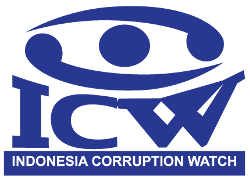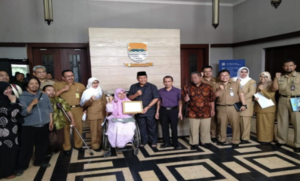Project
POPSiCLE
-
Amount Funded
188,699 EUROProject Duration
01 Aug 2018 - 31 Aug 2020 -
-
Lead organisation
-
Indonesia Corruption Watch (ICW) is a non-profit organisation fronted by a number of activists committed to eradicate corruption in Indonesia by strengthening the position of the organised public in the efforts to allow public monitoring over the state and to participate in the state’s decision making process in order to establish democratic and uncorrupted governance that upholds justice and equality in economy, social and gender. Mission: 1. To integrate the anti-corruption agenda in order to strengthen participation of the organized public in the monitoring and decision-making process of public policies. 2. To empower potential actors that would participate in establishing a clean political, judicial, economic and bureaucratic system free from corruption and based on social justice and gender equality.
-
Organisation
Indonesia Corruption Watch (ICW) is a non-profit organisation fronted by a number of activists committed to eradicate corruption in Indonesia by strengthening the position of the organised public in the efforts to allow public monitoring over the state and to participate in the state’s decision making process in order to establish democratic and uncorrupted governance that upholds justice and equality in economy, social and gender. Mission: 1. To integrate the anti-corruption agenda in order to strengthen participation of the organized public in the monitoring and decision-making process of public policies. 2. To empower potential actors that would participate in establishing a clean political, judicial, economic and bureaucratic system free from corruption and based on social justice and gender equality.
-
Project
Article 135 of Law No 8 in 2016 instructed national and local governments to allocate budget for the implementation, protection and fulfilment of People with Disability (PwD) rights in national budget (APBN), local budget (APBD), as well as other sources of state funds. This programme will try to determine and test the extent to which this instruction is observed in the regions, especially regarding budget allocation in local institutions, such as the Social Office, Health Office, as well as the Education and Sports Office. Indonesian Corruption Watch and identified local partners will conduct a current problem mapping about delivery and quality of public service for PwD, to be cross-referenced with the budgeting commitment of local governments as reflected from the budget analysis. Local Civil Society Organisations (CSO) partners and PwD groups will also build their capacity to conduct public information access testing and non-litigation adjudication, to learn the principals and basic technics of investigation, and (if possible) conduct independent investigation on local aid funds misappropriations. Therefore, this programme will attempt to produce simple investigation reports in addition to a policy brief about the pro-PwD state budget and mainstreaming of PwD interests in local agenda, as well as a draft of minimum PwD public service standard.
-
-
Article 135 of Law No 8 in 2016 instructed national and local governments to allocate budget for the implementation, protection and fulfilment of People with Disability (PwD) rights in national budget (APBN), local budget (APBD), as well as other sources of state funds. This programme will try to determine and test the extent to which this instruction is observed in the regions, especially regarding budget allocation in local institutions, such as the Social Office, Health Office, as well as the Education and Sports Office. Indonesian Corruption Watch and identified local partners will conduct a current problem mapping about delivery and quality of public service for PwD, to be cross-referenced with the budgeting commitment of local governments as reflected from the budget analysis. Local Civil Society Organisations (CSO) partners and PwD groups will also build their capacity to conduct public information access testing and non-litigation adjudication, to learn the principals and basic technics of investigation, and (if possible) conduct independent investigation on local aid funds misappropriations. Therefore, this programme will attempt to produce simple investigation reports in addition to a policy brief about the pro-PwD state budget and mainstreaming of PwD interests in local agenda, as well as a draft of minimum PwD public service standard.
-
Article 135 of Law No 8 in 2016 instructed national and local governments to allocate budgets for the implementation, protection and fulfilment of rights of People with Disabilities (PWDs) in the national budget (APBN), local budget (APBD), as well as other sources of state funds. The Indonesia Corruption Watch began a project that sought to determine and test the extent to which this instruction has been observed in the regions, especially regarding budget allocation in local institutions, such as the Social Office, Health Office, as well as the Education and Sports Office.
Indonesia Corruption Watch (ICW) is a non-profit organization fronted by a number of activists committed to the eradication of corruption in Indonesia by strengthening the position of the organized public in the efforts to allow public monitoring over the state and to participate in the state’s decision-making process in order to establish democratic and non-corrupt governance that upholds justice and equality in economic, social and gender relations.
The project, PWD Oriented Public Service with Community-based Local Engagement (POPSiCLE), aimed to improve access to public services for people with disabilities (PWDs) by focusing on two outcomes, to strengthen policy to deliver pro-PWDs public services, and to improve PWDs rightsholders capacity to advocate for public services issues. ICW and local partners conducted problem mapping about delivery and quality of public service for PWDs and cross-referenced with the budgeting commitment of local governments as reflected from the budget analysis. Local CSO partners and PWDs groups built their capacity to conduct public information access testing and non-litigation adjudication, learning the principal and basic techniques of investigation, and (if possible) conduct independent investigation on local aid funds misappropriations. The project produced simple investigation reports in addition to a policy brief about pro-PWDs state budget and mainstreaming of PWDs interests in local agenda, as well as a draft of minimum PWDs public service standard.
“We learned a lot from Voice. Through our inclusive program ICW understanding and knowledge of the importance of campaign and advocacy that are more accessible to PWD has broadened. It is basically not a new idea, but as this project is our first project related to the disability issue, we just realized that our activities and products were not accessible enough for PWD. We even rarely involved PWD communities in our work on anti-corruption issues.” – Dewi, Project Manager of ICW
The PWDs community involved in this program increased their knowledge and skills in advocating for local policies using new approaches and perspectives. PWDs networks in the cities of Bandung, Surakarta, Makassar, and Kupang were able to make surveys, analyze the local budget, and promote information disclosure through Law 14 of 2008 on Public Information Disclosure (KIP). This new capability is important not only in relation to this project but will also be useful in advocating issues of concern to them in the future.
Another important achievement of the project was related to the survey activity. The PWDs were not only respondents but were actively involved in forming questionnaires, field surveys, data entry and data processing, analysis, and presenting the findings and recommendations to the policymakers through audience forum and public discussion. In the second survey concerning the distribution of Covid-19 social assistance, they were involved in the preparation of survey instruments. The skills gained from this program and the knowledge they have acquired can be used in future surveys for other researchers thus translating to livelihoods for the PWDs.
Publication of the survey: https://oxfam.box.com/v/ICWSurveyResults
Project partners in Bandung, Bandung Independent Living Center (BILiC), became one of three Disable Peoples’ Organisations (DPOs) that were invited by the People’s Representative Council (DPRD) to provide input regarding the Perda (local regulations) draft, the new regulations in question being the Regional Regulation (Perda) of Bandung No. 15 of 2019 on the Protection and Fulfillment of the Rights of PWDs, Perda Surakarta No. 9 of 2020 on the Equality of PWDs, and the Perda Kupang No. 2 of 2019 on the Protection and Fulfillment of Disability Rights.
Strengthened capacities of the PWDs community is one of the outcomes of this program. Capacity building for the PWDs community is important because with the ability to survey health services and distribution of social assistance programs, analyze local budgets, and obtain information documents, the PWDs community can better know, assess, evaluate, and advocate for central or regional government policies. strive to fulfill public services for persons with disabilities. By being able to conduct independent surveys, the PWDs community can collate PWDs assessments related to public services or government programs and map the problems. The PWDs community can then convey data-based findings and recommendations to policy makers so that future programs and services will be better. With the existence of data, especially since the data is not managed by the government, the PWDs community will increasingly be heard and taken into account by policy makers. As well as the benefits of being able to conduct surveys, the ability related to reviewing and formulating regional budget recommendations is important to make PWDs have a better database when conducting budget advocacy. The regional budget is a concrete manifestation of local government policies and positions that are important for intervention by PWDs in the context of encouraging more accessible public services for PWDs.
Recommendation on Minimum Standard of Services for PWDs: https://oxfam.box.com/s/t3q62l77ryuognm2wl2m57b3jz503ayr





